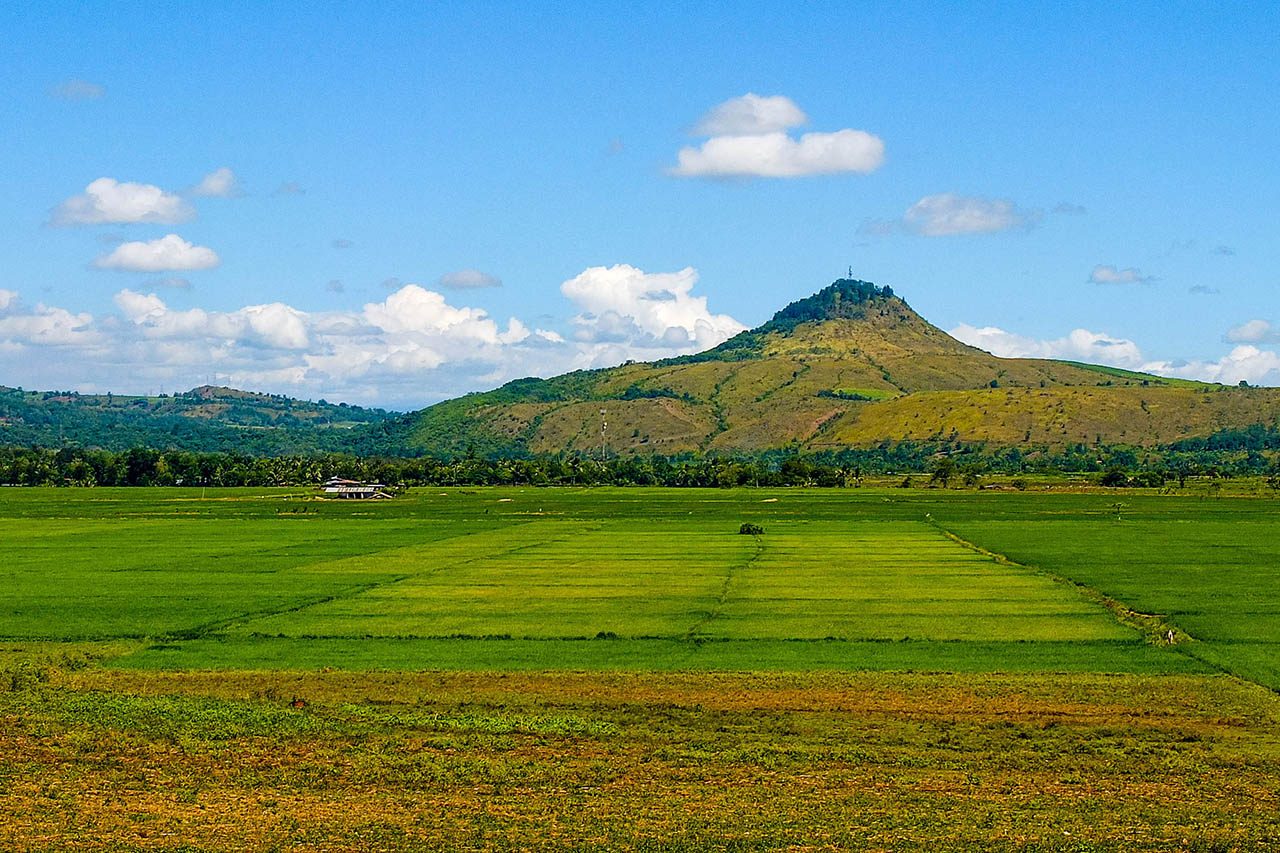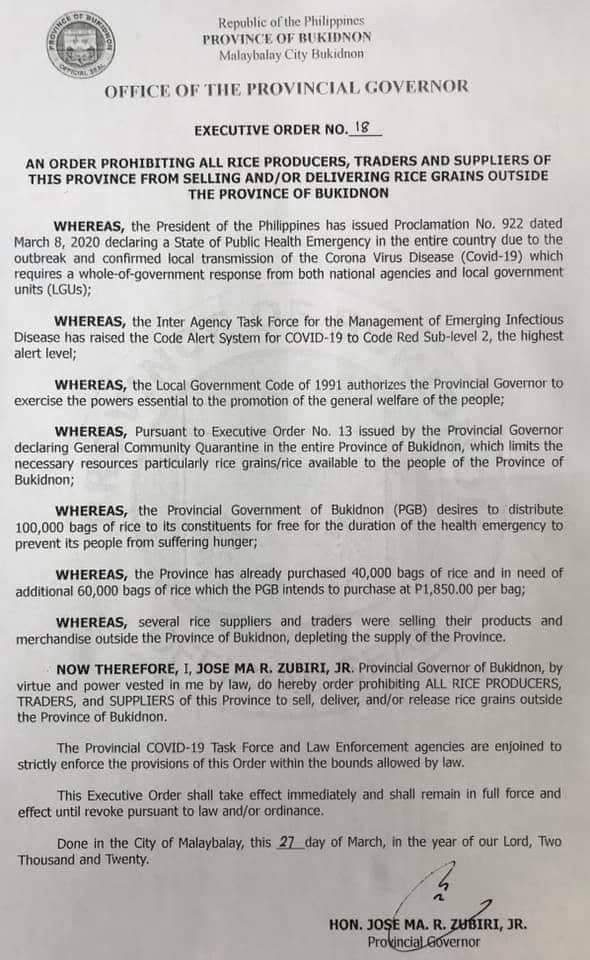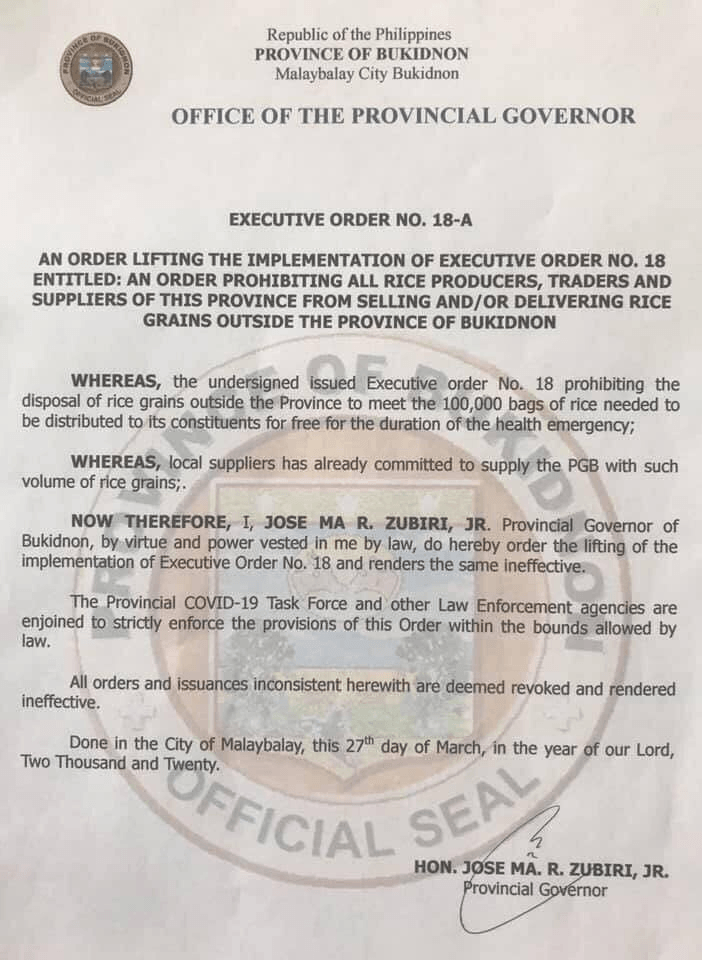SUMMARY
This is AI generated summarization, which may have errors. For context, always refer to the full article.

CAGAYAN DE ORO CITY, Philippines (UPDATED) – Bukidnon Governor Jose Maria Zubiri imposed, and then lifted, a ban on rice exports on the same day amid the coronavirus-related lockdown in the province.

On Friday, March 27, Zubiri issued Executive Order No. 18, prohibiting all rice producers, traders and suppliers of Bukidnon from selling and/or delivering rice grains outside the province effective immediately.
Calling it the “Bukidnon First” policy, the governor justified his decision as the provincial government had to distribute 100,000 bags of rice to residents identified as most vulnerable. At the time, the province had been able to purchase 40,000 bags of rice earlier and needed 60,000 more, which it intended to purchase at P1,850 per bag.
Later that day, he issued Executive Order No. 18-A, lifting the ban, citing the commitment made by suppliers to provide the provincial government what it needed to purchase.
The governor said allowing domestic export would deplete the province’s supply.
Considered hoarding
Before Zubiri issued his order to lift the rice export ban, National Economic Development Authority (NEDA) Northern Mindanao Director Mylah Faye Cariño had warned that the governor’s action was considered hoarding.
“The economic and governance cluster will meet because we will look into the implications of this order,” Cariño said.
She said the province had enough food supply for at least 106 days: “We have enough supply for 106 days, not only rice but food, basic commodities.”
“We will certainly invoke existing policies that would conflict with their EO, [including] national policies in terms of hierarchy, it is above such EO,” Cariño said.

When sought for clarification, Brigadier General Rolando Anduyan, the Northern Mindanao Regional police director, said that he understood that politicians are only concerned with their constituents, but the police has to follow national law.
“All the law enforcement agencies including the Armed Forces of the Philippines will follow what is directed to us coming from the National Headquarters. If there are infractions of the law, we have the DILG which is in-charge of the governance, and they will review it,” Anduyan said.
Zubiri is the father of Senator Juan Miguel Zubiri, who tested positive on March 16 for COVID-19, the disease caused by the novel coronavirus.
Tawi-Tawi shortage
Meanwhile, the rice supply of Tawi-Tawi is reportedly dwindling due to the lockdown in other provinces.
Last week, Tawi-Tawi Governor Ysmael Sali said that rice supply in his province of almost 400,000 people was going to be depleted soon.
“With the imposition of lockdowns by the different local government units, the movement of food supplies has been affected, especially the transport of goods to remote areas,” Emmanuel Piñol of the Mindanao Development Authority said. The scenario is almost the same in Basilan and Sulu, Piñol added.
To address this, 2,000 metric tons of rice was being imported from from Iloilo to Bongao.
The Tawi-Tawi situation has prompted MinDA to draw up the Self-Sustaining Food Security Strategy (SSFSS), to ensure the efficient movement of and availability of food in various Mindanao areas during this period of countrywide quarantines by local government units.
The SSFSS links the different local government units (LGUs) for the unhampered movement of food items, including rice and marine products.
Piñol said the agency drew the SSFSS earlier this week as a preemptive move against the uncoordinated food supply distribution in Mindanao that could create artificial shortages.
He said so far, 3 governors, including Sali, had adopted the strategy.
Meanwhile, Davao Oriental Governor Nelson Dayanghirang also said his province needed additional rice supply. He had been told that the neighboring province of Davao de Oro has excess rice production.
North Cotabato Governor Nancy Catamco would also implement SSFSS.
Catamco, he said, would also distribute upland rice seeds to complement the lowland production areas.
“Under North Cotabato’s SSFSS implementation, the provincial government will also distribute vegetable seeds and backyard chicken breeders to encourage farmers who are confined to their farms to produce more food,” he said.
Catamco said North Cotabato farmers also produce such as products as chicken, hogs, eggs, and vegetables aside from rice and corn.
“We don’t know how long the problem would last that is why we have to be prepared,” Catamco said. – Rappler.com
Add a comment
How does this make you feel?
There are no comments yet. Add your comment to start the conversation.